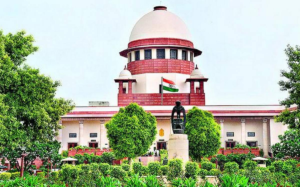
New Delhi: The Supreme Court on Thursday said that judicial officers who have completed 7 years of practice at the Bar before entering service will be eligible for appointment as judges in the district.
This verdict was delivered by a 5-judge bench headed by the Chief Justice of India, B.R. Gavai. The bench stated, “Judicial officers who have completed 7 years of experience at the Bar before being recruited into the subordinate judicial service shall be entitled to be appointed as District Judge/Additional District Judge in the selection process for the post of District Judges through the direct recruitment process.”
The bench said that the eligibility for appointment as a District Judge/Additional District Judge should be determined at the time of application.
“Although under Article 233(2) there is no eligibility prescribed for a person already in the judicial service of the Union or a State to be appointed as a District Judge, in order to provide a level playing field, we direct that a candidate applying as an in-service candidate should have a combined experience of 7 years as a Judicial Officer and an advocate.”
The bench said that any person who has been or is in judicial service and has a combined experience of 7 years or more as an advocate or a judicial officer would be eligible to be considered and appointed as a District Judge/Additional District Judge under Article 233 of the Constitution.
The bench stated, “In order to ensure a level playing field, we further direct that the minimum age for being considered and appointed as a District Judge/Additional District Judge for both advocates and Judicial Officers would be 35 years of age as on the date of application.”
The top court directed the state governments to frame rules specifying the eligibility for in-service candidates. The apex court rejected the claim that Article 233(2) reserves a 25% quota for direct recruitment.
The bench said that members of the judicial service have faced injustice and clarified that its decision will be applicable from the date of the judgment, except in cases where the High Court has passed interim orders.
The bench remarked that the interpretation made by judgments from Satya Narain Singh to Dheeraj Mor is, in our view, completely inconsistent with the provisions of clause (2) of Article 233 of the Constitution. The bench added, “Thus, finding that the law laid down by this Court in the aforesaid cases does not correctly interpret the provisions of Article 233, if we fail to correct the legal position, we would be perpetuating an injustice that has been going on for decades.”
Article 233 states, “Appointments of persons to be, and the posting and promotion of, district judges in any State shall be made by the Governor of the State in consultation with the High Court exercising jurisdiction in relation to such State.” It further states, “A person not already in the service of the Union or of the State shall only be eligible to be appointed a district judge if he has been for not less than seven years an advocate or a pleader and is recommended by the High Court for appointment.”
This Supreme Court verdict came on a reference made on August 12, 2025, on the question of whether judicial officers selected into the subordinate judicial services after practicing as an advocate for seven years can also apply for direct recruitment to the post of district judges, which is available only to experienced members of the bar.
The bench also included Justices M. M. Sundresh, Aravind Kumar, Satish Chandra Sharma, and K. Vinod Chandran.Petitions were filed seeking a review of the February 19, 2020 judgment in the case of Dheeraj Mor v. Hon’ble High Court of Delhi (2020).
A three-judge bench had ruled that members of a state’s judicial service could be appointed as district judges through promotion or a limited departmental competitive examination.
The bench headed by the Chief Justice had said on September 12 that it would begin hearing these issues from September 23 and would hear arguments for three days until September 25. The bench had stated that it would have to examine whether the combined experience of practice at the bar followed by judicial service could be counted for eligibility.
The posts of ADJ, which are part of the higher judicial service, are filled through the promotion of lower judicial officers. These posts are also filled through the direct recruitment of lawyers who have at least seven years of experience at the bar.



